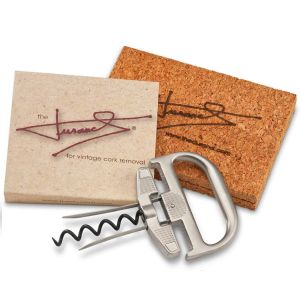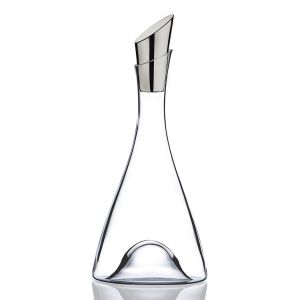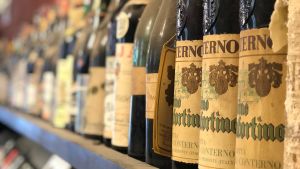Before You Buy Aged Wine...
Professional Tips to Consider Before You Buy Aged Wine or Wine for Cellaring
If you’re like most Americans, you probably don’t have a proper wine cellar. And unless you’re lucky enough to live in a climate with low summer temperatures and consistent underground temperatures, you’ll need this kind of storage to properly age wine.
Alternatively, “wine fridges” are expensive, noisy, and bulky. A lot of folks, particularly who live in cities where real estate is at a premium and residences are small, don’t have a wine refrigerator either. If you don’t have a cellar or a good-quality wine refrigerator, you probably should not be aging your own wine.
Additionally, how many of us have the patience to age our own wine? My husband does, but I’d bet left to my own devices I’d drink much of our wine before it reaches peak maturity, simply because it’s too tempting not to.
If you lack a cellar and patience, I have great news: you can explore aged wine without a wine cellar or waiting years to try it!
The trick is to know where to buy wine that has already been aged. This article, Part IV of my Aged Wine Guide, will walk you through what you need to know before you buy aged wine and where to find perfectly-cellared age-worthy bottles.
Wines Have Provenance
Provenance is the history of who has owned a bottle, where it was cellared, and under what conditions. Like fine art, the provenance of an aged fine wine is a must-know before you buy.
For this reason, I recommend only buying aged wine that has always been in the possession and control of the winery who produced it, specialty retailers with specialized transportation and storage equipment, and auction houses who will certify the wine they’re selling has been properly stored (sometimes because they’ve had the wine in their own storage facility since it left the winery).
The last part of the provenance is how the wine will be transported to you after you purchase it. Depending on its age and the distance it must travel, this can be a critical component of your enjoyment of the wine. Very old wine is delicate and must be handled carefully, ideally without much vibration or any exposure to light.
Why is Aged Wine So Expensive?
You may be wondering, why is aged wine so expensive? There are a few very good reasons why aged wine will set you back significantly more dough than buying a new release from a winery or wine shop: it started out expensive, cellaring costs money, scarcity pricing, provenance, and investment-grade wine profit.
Reason #1: Most wine worth aging started out expensive. Think classified Bordeaux and Burgundy, Napa Cabernet Sauvignon, and Sauternes (dessert wine from Bordeaux).
Reason #2: Wine that’s sitting around developing in a cellar has a carrying cost. The electricity to maintain the correct temperature and humidity in a cellar isn’t free. Neither is the real estate that wine occupies inside the cellar. Aged wine costs typically reflect these expenses.
Reason #3: Scarcity pricing. You often see the phrase “fine and rare wine” in the wine world. While these two things go hand in hand, rare wine starts to get pricey merely because there’s very little of it to be had. Michael Peltier, the Senior Fine Wine Specialist at Millesima, offered this perspective. Rareness is sometimes about production. A great example is Salon Champagne that only bottles wine in special vintages. The 2008 vintage was only bottled in magnum and only 2000 bottles were produced. Rareness can also be about general scarcity (particularly with aged wine) like a 1945 Mouton Rothschild.
Reason #4: Provenance. If you are looking at an aged rare wine to purchase, a wine with a documented provenance among professional sellers is worth much more than the same wine that your Dad’s friend had sitting in his basement.
Reason #5: Collectors. Some wines are never drunk, they’re just traded back and forth among collectors who treat them as investments.
What to Have on Hand for Aged Wine
When it comes to aged wine, the standard equipment just won’t do. There are specialized cork pullers for delicate older corks and specialized decanters for delicate older wines. Here are the best ones to get according to most industry professionals. For more details about this process, read Vinous Media’s article on how to open and decant aged wine.

Specialized Wine Opener for Aged Wine
Buy it for $145.00Cork Puller for Aged Wine
There is a style of cork puller (corkscrew) called an Ah-So. This is a two-pronged corkscrew with a wide handle designed specifically to remove a cork from an older bottle of wine without destroying the cork. A general recommendation is that any wine older than 10 years should be opened with this style of cork remover because corks degrade as the wine seeps through them during cellaring.
Wine Access has a video of how to use an Ah-So here and Jordan Winery also has a nice video of how and why to use it.
Like most wine accoutrement, you typically get what you pay for. You can find an Ah-So style cork puller for as little as $10 on Amazon, you can go for the gold standard option made by Durand (retail is $150 at Durand.com or $145 on Amazon), or you can pick your favorite Ah-So at any price.
Decanter for Aged Wine
When a wine is younger, we decant it to open it up and help it breathe. What does this mean exactly? Well, wine is a delicate balance of chemistry, and it is enhanced by the process of aeration. Aeration softens tannins and releases certain gases that develop in the bottle while introducing oxygen.
There are plenty of great resources online for the rules of when and when not to decant, but in general it’s a good idea to decant an aged wine right before service. With an aged wine, you don’t really want to introduce oxygen, or even jostle it around, because it is even more delicate. You still need to decant it though, because over time sediment forms in the bottle and sediment is unpleasant in your mouth. This helps you keep the sediment in the bottle and not in your wine glass.
I think Jancis Robinson describes it best in her video about decanting wine. You can see the video about her Mature Wine Decanter at Wine.com (though it is sold out there). Here are two similar alternatives for your consideration, as well.
item not found
Elegant Aged Wine Decanter
Buy it for $59.95
Fine Wine Decanter for Aged Wine
Buy it for $199.97
